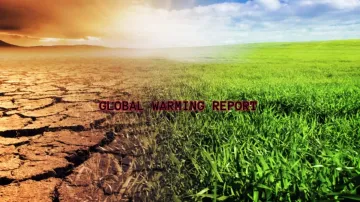'Earth's issuing a distress call': UN issues 'red alert' on climate change after record-hot year 2023
A report by the World Meteorological Organisation said the climate goal of limiting global temperatures to 1.5 degrees Celsius is in increasing jeopardy and efforts for a solution have been inadequate. The 12-month period from March 2023 to February 2024 averaged 1.56 degrees beyond the limit.

Geneva: The United Nations' weather agency sounded a 'red alert' about global warming as 2023 was registered as a record-hot year, with record-smashing increases in greenhouse gases, land and water temperatures and melting of glaciers and sea ice. The World Meteorological Organisation (WMO) warned that the world's efforts to reverse the trend have been inadequate and there was a "high probability" that 2024 will be another record-hot year.
In a "State of the Global Climate" report released on Tuesday, the agency raised concerns that a much-wanted climate goal - to limit planetary global warming to no more than 1.5 degrees Celsius from pre-industrial levels - is in increasing jeopardy. “Never have we been so close – albeit on a temporary basis at the moment – to the 1.5 degrees C lower limit of the Paris agreement on climate change,” said Celeste Saulo, the agency's secretary-general.
The 12-month period from March 2023 to February 2024 pushed beyond that 1.5-degree limit, averaging 1.56 Celsius higher, according to the European Union's Copernicus Climate Service. It said the calendar year 2023 was just below 1.5 degrees at 1.48 degrees Celsius, but a record-hot start to this year pushed beyond that level for the 12-month average.
Saulo called the climate crisis “the defining challenge that humanity faces” and said it combines with a crisis of inequality, as seen in growing food insecurity and migration. WMO said the impact of heatwaves, floods, droughts, wildfires and tropical cyclones, exacerbated by climate change, was felt in lives and livelihoods on every continent in 2023.
Five points on UN report:
- 2023 was the warmest year on record with temperatures above the pre-industrial average.
- Concentrations of three main greenhouses gases - carbon dioxide, methane and nitrous oxide- reached record-high observed levels
- Ocean heat content reached its highest level in the 65-year observational record and global mean sea level also reached a record high.
- Antarctic sea-ice extent reached an absolute record low in February. Glaciers in Switzerland lost 10 per cent of their remaining volume in the ast two years.
- Extreme heat affected many parts of the world - such as the wildfires in hawaii, Canada and Europe along with devastating floods in Greece, Bulgaria, Turkey and Libya.
'Earth's issuing a distress call'
Omar Baddour, WMO's chief of climate monitoring, said the year after an El Niño event — the cyclical warming of the Pacific Ocean that affects global weather patterns — normally tends to be warmer. “So we cannot say definitively about 2024 is going to be the warmest year. But what I would say: There is a high probability that 2024 will again break the record of 2023, but let's wait and see,” he said.
In response to the alarming report, UN Secretary-General Antonio Guterres said, "Earth's issuing a distress call. The latest State of the Global Climate report shows a planet on the brink. Fossil fuel pollution is sending climate chaos off the charts."
In 2023, over 90 per cent of ocean waters experienced heat wave conditions at least once. Glaciers monitored since 1950 lost the most ice on record. Antarctic sea ice retreated to its lowest level ever. “Topping all the bad news, what worries me the most is that the planet is now in a meltdown phase — literally and figuratively given the warming and mass loss from our polar ice sheets,” said Jonathan Overpeck, dean of the University of Michigan School for Environment and Sustainability, who wasn't involved in the report.
“This list of record-smashing events is truly distressing, though not a surprise given the steady drumbeat of extreme events over the past year,” said University of Arizona climate scientist Kathy Jacobs, who also wasn't involved in the WMO report, adding that the cost to biodiversity and quality of life is incalculable.
A glimmer of hope
However, the agency also offered “a glimmer of hope” in trying to keep the Earth from running too high a fever. It said renewable energy generation capacity from wind, solar and waterpower rose nearly 50 per cent from 2022 to a total of 510 gigawatts.
"Such growth marks the highest rate observed in the past two decades and, as the International Energy Agency (IEA) indicates, demonstrates the potential to achieve the clean energy goal set at COP28 to triple renewable energy capacity globally to reach 11,000 GW by 2030," the report said.
“Each year the climate story gets worse; each year WMO officials and others proclaim that the latest report is a wake-up call to decision-makers,” said University of Victoria climate scientist Andrew Weaver, a former British Columbia lawmaker. "Yet each year, once the 24-hour news cycle is over, far too many of our elected leaders return to political grandstanding, partisan bickering and advancing policies with demonstrable short-term outcomes."
The report comes as climate experts and government ministers are to gather in the Danish capital, Copenhagen, on Thursday and Friday to press for greater climate action, including increased national commitments to fight global warming.
(with AP inputs)
ALSO READ | Climate activist Greta Thunberg acquitted of blocking oil conference in London trial